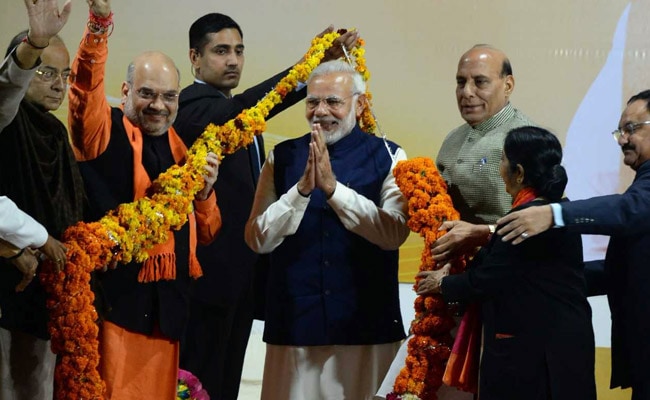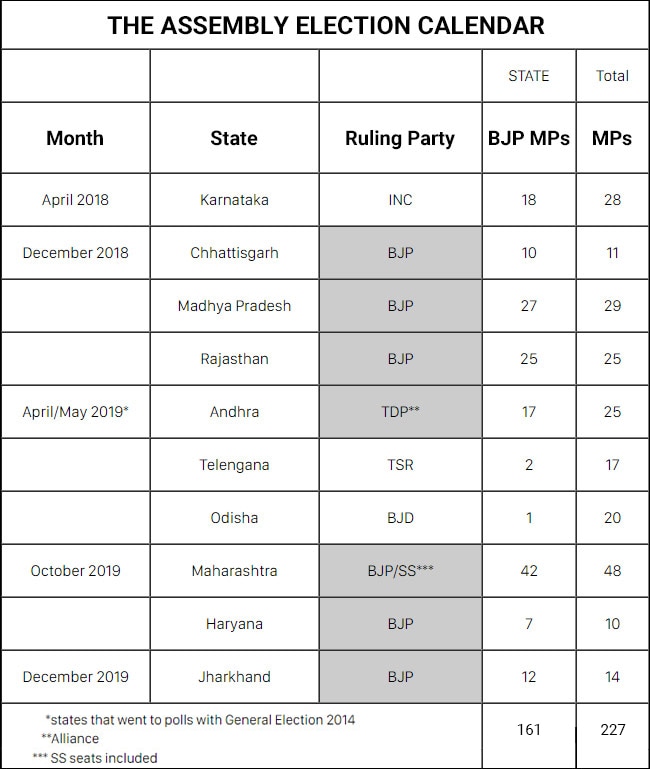The BJP has never made a secret of wanting the NDA to have a two-thirds majority in the Lok Sabha and control half of the states so that it can amend the constitution at will. Its key supporters have already launched Mission 360+ as a sequel to its highly successful Mission 272. Amit Shah, the BJP President, was reportedly planning for a simultaneous election campaign as early as August last year before the tense situation in Gujarat forced him to focus on his home state. But to get to 360+, the BJP needs everything going for it, especially protecting the majorities in every state that it holds. And that's where going for an early general election and as many assemblies as possible makes sense.

PM Narendra Modi and top BJP leaders at party headquarters after wins in Gujarat and Himachal Pradesh polls
If these three states were to vote in December without a national election, there would probably be a repeat of the Gujarat scenario (tougher fight than BJP would like) with one major difference: none of these are the PM's home state and he can't appeal for "Gujarati support for a Gujarati". Local issues would dominate the campaigns and the personalities of the current incumbent Chief Ministers would play a more important role than Modi or central government policies. And, unlike UP, it would be the BJP defending its record which strips the PM of the chance to promise huge change; the campaigns would have to stress "you never had it so good". But in a country where progress is slow, that's a hard sell and the chances of slipping to defeat in one or more of them are not low.
Losing a state or more is not an option for the BJP. In these three states, it's a straight fight with the Congress and any defeat would be a big morale boost for the Congress and could help in cementing -support from other opposition parties, especially in UP, which - with its 80 seats (73 with the BJP+ currently) - decides the winner of the big national election. Furthermore, it always helps to have a state government that is your own when there is an election.
If anyone of you or your friends would want to Volunteer for the 2019 Campaign - Please read below and register yourself - #Mission360+ https://t.co/iNzQD3nhjo
- Vijay (@centerofright) January 2, 2018

The Modi factor is the most important election weapon the BJP has and simultaneous polls will allow Modi to make the campaign about himself in states like Madhya Pradesh, while deflecting from the BJP state government's shortcomings. It will be a campaign that will revolve around one major issue: who does the state want as PM, Modi or some rag-tag opposition bunch which may be led by Rahul Gandhi? Modi is a campaigner par excellence and unbeatable at showing that he is being victimized, playing up the persecution card and that only he can save India; the results are probably a foregone conclusion if he gets the chance to take this route with simultaneous polls. Also, the vast majority are unlikely to split their votes when voting for the party at the centre and the party in the state in the case of jointly-held elections.
Which is why the BJP will be very tempted to add its other states to the mix. In Maharashtra, besides farmers' issues and Dalit anger, it is facing a challenge from its own ally, the Shiv Sena. The BJP-Sena partnership swept the Congress-NCP out of their sugar-mill-coated havens and if the Shiv Sena were to go separately in the assembly elections, then the BJP would hurt. Better to risk an early state poll with the general election and hope that Modi's charisma carries the day. Similarly in Haryana, only a combined election could save the non-functioning Khattar government.
The coup for the BJP in calling a general election in December is that it would give the Election Commission the chance to invoke the 6-month clause. What is this? Well, it can legitimately claim that it cannot do two elections (national and state) within six months. So Odisha, Telangana and Andhra Pradesh, due for election next year, would be advanced for voting to December too. The last two may not be really that averse to it, since in Andhra the TDP is already (despite some noises) tied to the BJP apron, and in Telangana, the TRS is not averse to the BJP and may even consider an alliance. Odisha especially is ripe for BJP inroads given the long incumbency of the Patnaik regime and the recent noises from Jay Panda, the suspended BJD MP.
From the point of view of the opposition, having simultaneous elections would be far from ideal. Given the financial resources of the Congress, they would find it difficult to match the money muscle of the BJP in an election double-header. In fact, for them, a victory or two in December standalone assembly elections would help fill their coffers before the big fight in 2019. Keeping the Congress poor would be another potent reason for the BJP to gun for simultaneous polls.
The Economic Survey has hinted at an election (populist) budget and Arun Jaitley's speech tomorrow is likely to sacrifice some fiscal prudence by showering rural India with so-called benefits for farmer, and encouraging employment-intensive industry over capital-intensive industry, giving tax sops to the middle-class and generally trying to make everyone happy. The BJP will secretly be hoping that the monsoon is good and oil prices don't go up any further which could ruin the perfect run to another great election victory in the winter.
Finally, there some who argue a snap election after this budget in the summer, along with as many BJP states as possible, would be a brilliant strategy as the ruling party has money and the opposition is divided and broke. On the negative side, the last time the BJP called an early poll under Vajpayee, they lost. But Vajpayee is no match for Modi as a campaigner. And Modi is a man who is willing to take risks. I'm betting on him letting loose the great election tamasha in 2018.
(Ishwari Bajpai is Senior Advisor at NDTV.)
Disclaimer: The opinions expressed within this article are the personal opinions of the author. The facts and opinions appearing in the article do not reflect the views of NDTV and NDTV does not assume any responsibility or liability for the same.


